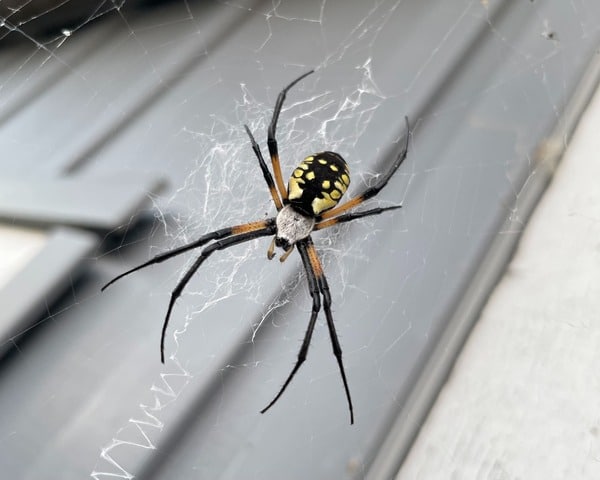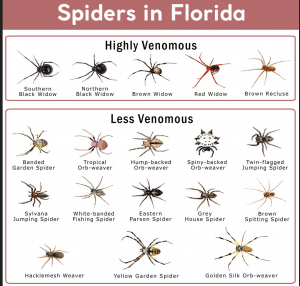
25 Jul Common Spiders Found In South Florida
Common Spiders Found In South Florida
In South Florida, the presence of various spider species is a common concern among homeowners. As a leading provider of organic pest control solutions, Pest Busterzz is dedicated to protecting your home from these eight-legged invaders while ensuring the safety of your family and the environment. In this comprehensive guide, we will delve into the most common spiders found in South Florida, offering insights into their identification, behavior, and organic control methods.
Southern Black Widow (Latrodectus mactans)
Identification: Shiny black body with a distinctive red hourglass shape on its abdomen. Females are larger, with a body length of about 1.5 cm.
Habitat: Prefers dark, secluded areas such as garages, sheds, under furniture, and woodpiles.
Behavior: Primarily nocturnal, females are known for their venomous bite, which can cause severe pain and muscle cramps in humans.
Control: Regular inspections, especially in dark and unused spaces. Use organic spider repellent sprays and ensure window screens are intact to deter black widows.
Brown Recluse (Loxosceles reclusa)
Identification: Brownish spider with a violin-shaped mark on its back. They have six eyes arranged in pairs.
Habitat:Dry, sheltered locations like closets, attics, and behind wall hangings. Often found in cardboard boxes and old clothing.
Behavior: Solitary and nocturnal. Their bite can cause necrotic lesions and requires medical attention.
Control: Seal cracks and crevices, reduce clutter, and use organic sticky traps to capture them. Regular vacuuming can help remove spiders and their prey.
Yellow Sac Spider (Cheiracanthium inclusum)
Identification:Pale yellow or greenish color with a dark stripe running down the length of the abdomen. They have long, slender legs.
Habitat: Commonly found in gardens, along walls, and in ceiling corners. They build small silk sacs for retreat.
Behavior: Active hunters at night, they prey on insects and other spiders. Their bite can cause mild to moderate pain and swelling.
Control: Reduce outdoor lighting that attracts insects, which in turn attract spiders. Pest Busterzz’s organic perimeter treatments can create a barrier to keep them out.
Wolf Spider (Lycosidae)
Identification:Large, hairy spiders with a distinctive eye arrangement in three rows. They range in color from brown to gray.
Habitat:Ground dwellers, often found in gardens, under stones, and in leaf litter. They do not spin webs.
Behavior: Excellent hunters, they rely on their speed and eyesight to catch prey. They are generally harmless to humans.
Control: Keep the yard clean and free of debris. Organic insecticidal sprays can be effective in deterring wolf spiders from entering your home.
Orb Weaver Spiders (Araneidae)
Identification: Known for their intricate orb-shaped webs. They come in various colors and patterns, with some having spiky or lobed abdomens.
Habitat: Commonly found in gardens, near lights, and between plants. They rebuild their webs daily.
Behavior:Primarily nocturnal, they feed on flying insects caught in their webs. They are not aggressive towards humans.
Control: Regularly remove webs with a broom or hose. Planting eucalyptus and other spider-repellent plants can help keep orb weavers away.
Jumping Spiders (Salticidae)
Identification: Small, compact spiders with excellent jumping ability. They have large front eyes and a distinctive, colorful pattern on their bodies.
Habitat: Often seen on walls, windowsills, and plants, hunting during the day. They prefer sunny areas.
Behavior: Curious and active, they use their excellent vision to stalk and pounce on prey. Their bite is rare and usually harmless.
Control: Seal windows and doors to prevent entry. Organic, non-toxic sprays can be used to deter jumping spiders from indoor areas.
Huntsman Spider (Sparassidae)
Identification: Large, flat-bodied spiders with long legs. They are typically brown or gray and can have a leg span of up to 15 cm.
Habitat: Prefers to live under bark, in crevices, or in sheds. They are often seen on walls and ceilings.
Behavior: Fast and agile, they hunt insects and other invertebrates
Conclusion
Understanding the common spiders found in South Florida and their behavior is crucial for effective organic pest control. Pest Busterzz is committed to providing eco-friendly solutions to keep your home safe from these arachnids. By implementing regular inspections, sealing entry points, and utilizing organic control methods, you can maintain a spider-free environment. Pest Busterzz’s expertise in organic pest control ensures that your home is protected in a sustainable and environmentally friendly manner. For professional assistance and tailored organic pest control services, trust Pest Busterzz to safeguard your home from spiders and other pests. Remember, while spiders play a vital role in our ecosystem, it’s essential to manage their presence in our living spaces for our comfort and safety. With Pest Busterzz by your side, you can enjoy a spider-free home while supporting sustainable pest control practices.



No Comments